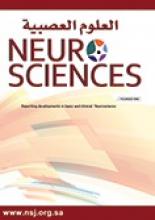Abstract
Objectives: To translate and validate the Arabic version of the Boston carpal tunnel questionnaire (BCTQ-A).
Methods: We recruited consecutive patients with carpal tunnel syndrome (CTS). Reliability was assessed with Cronbach α, reproducibility with intraclass correlation coefficients, construct validity with factor analysis, and responsiveness post carpal tunnel release (CTR) with the Wilcoxon signed-rank test.
Results: In 134 patients, the mean total scores for the symptom severity scale (SSS) and functional status scale (FSS) were 32.0±8.4 (α=0.88, ICC=0.88) and 18.5±7.6 (α=0.87, ICC=0.89), respectively. As in the original Boston carpal tunnel questionnaire (BCTQ), a 3-factor model of the BCTQ-A best fitted the data. The BCTQ-A, SSS, and FSS scores were significantly lower post-CTR.
Conclusion: The BCTQ-A is reliable, valid, reproducible, and responsive to interventions. The Arabic version can be now used with Arabic-speaking patients with CTS.
Footnotes
Disclosure. Authors have no conflict of interests, and the work was not supported or funded by any drug company.
- Received March 30, 2019.
- Accepted May 20, 2019.
- Copyright: © Neurosciences
Neurosciences is an Open Access journal and articles published are distributed under the terms of the Creative Commons Attribution-NonCommercial License (CC BY-NC). Readers may copy, distribute, and display the work for non-commercial purposes with the proper citation of the original work.






